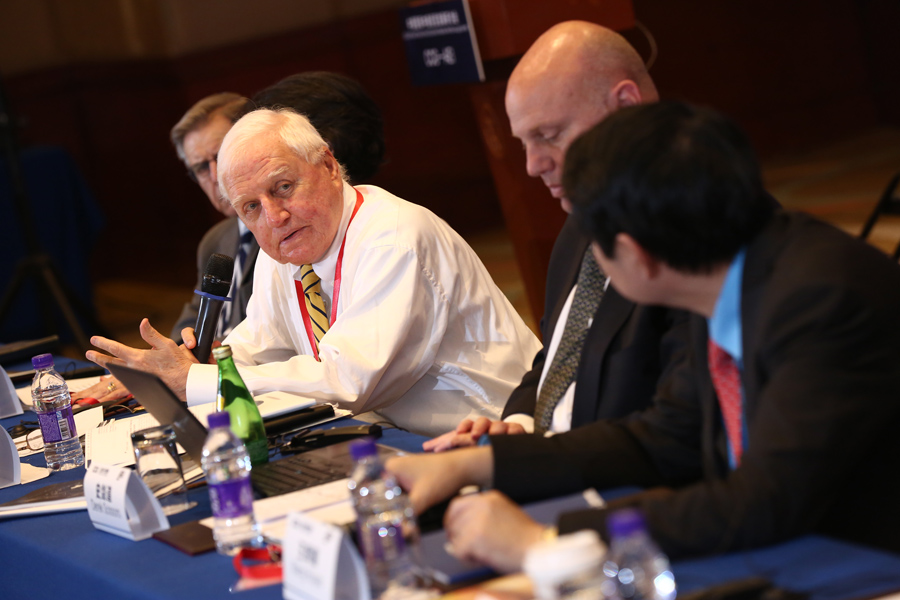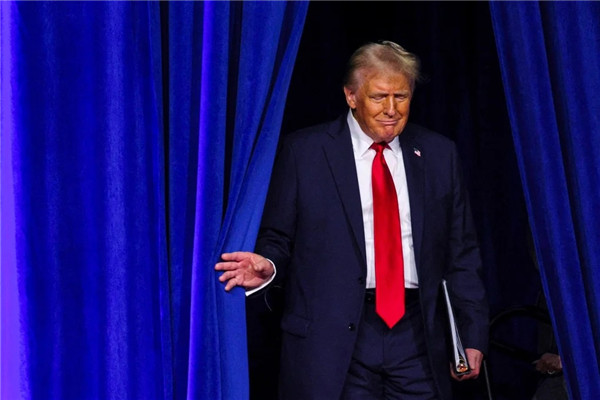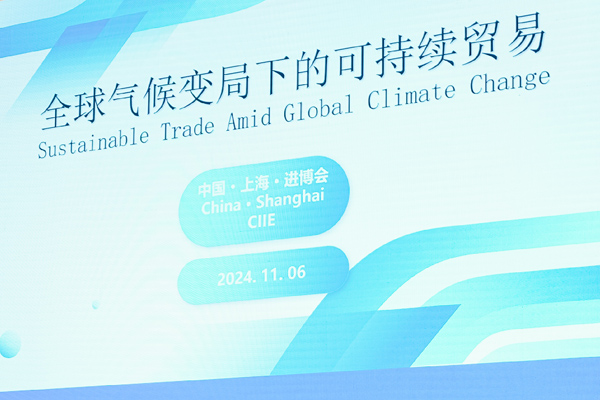Trade war averted, but warnings of more friction ahead
May 25 , 2017
Donald Trump’s administration has hailed warming relations with China as details of a new trade deal between China and the United States were released following a meeting between the two leaders at the US president’s Florida resort last month.
The deal demonstrates both nations’ confidence in economic cooperation and helps to avert bilateral trade friction.
Trump has long been focused on the trade deficit, the excess of imports over exports, as a sign of failing US competitiveness abroad. He particularly targeted China during his election campaign, accusing China of causing the loss of millions of factory jobs and vowing to impose a 45 percent tariff on imports from China. His comments cast a shadow over Sino-US economic and trade relations and led to fears of a trade war after his election.
However, since taking office, Trump has realized the harm of a possible confrontation between the two sides and chosen the smart option of cooperation. Trump’s choice is encouraging and enables the world to breathe a sigh of relief.
Wang Huiyao, president of the Center of China and Globalization, a Chinese think tank, praised the trade agreement in a seminar on Sino-US trade cooperation held in Beijing last week. He said it was the first step in a long term strategy that will eventually open China’s market to US industries, and that by establishing these friendlier trade ties now, the stage will be set for better negotiations on serious issues later. He also marveled at not only how quickly the deal was agreed upon, but how soon it will go into effect. These types of trade deals typically take months or years, rather than weeks.
CCG senior fellow Jiang Shan echoes Wang’s sentiments, saying that the deal is excellent news because it creates momentum for Sino-US bilateral cooperation. It will be conducive to strengthening mutual trust, reducing economic and trade friction, lowering uncertainties in the global economy and financial markets, and charting the course of China-US relations in decades to come.
While many see the deal as a positive advancement, some experts from both countries are warning that plenty of friction still lies ahead and there is a need for a more balanced trade relationship.
Huo Jianguo, former president of the Chinese Academy of International Trade and Economic Cooperation and CCG senior fellow, says the US trade deficit is a problem – but not for the reasons that Trump and other critics seem to think.
The key, Huo says, is that the trade deficit is due to a deeper problem – a re-balance in trade between the manufacturing industries across the East Asian trading nations and the US manufacturing sector.
According to the US Department of Commerce, the US goods trade deficit with China rose 21.7 percent to $347 billion last year while the deficit with Japan shrunk 16.1 percent from its level of $68.9 billion in 2000. The US trade deficit with China rises, but slides versus Japan. China has succeeded Japan as the US’s largest trade surplus country, filling the market gap left by Japan’s industrial structural adjustment.
The amount of US service exports to China is often overlooked when calculating the balance of trade. In this area, the US has a surplus with China. The US edge in service trade has huge potential to grow bigger in China as the world’s fastest-growing consumer market is poised to open its service sector wider to the US.
In Huo’s view, China and the US should reach consensus on the best way to understand and calculate the trade deficit.
Some question what can realistically be achieved.
“How can Trump effectively make a trade plan when he doesn’t even have a full team in place to conduct the negotiations, since he does not have either a China strategy or a China-Asia team in place?” asks Derek Scissors, a resident scholar at the American Enterprise Institute, a prominent conservative think tank. “With plenty of crucial positions to fill, there is still uncertainty for bilateral cooperation.”
Scissors says the new deal is meant to provide a “buffer zone” for settling trade friction. As China is the largest developing country in the world and the US is the largest developed economy, and as they share two-way trade valued at nearly $520 billion, Sino-US relations are certainly the most important economic ties in the world.
The deal is an agreement that covers a number of long-standing barriers in areas ranging from agriculture to energy to the operation of American financial firms in China.
China will open its borders to US beef no later than July 17, while cooked Chinese poultry is set to enter the American market. Companies from the US would also be able to ship liquefied natural gas to China.
Some of the points have previously been argued between China and the US, and not all observers are satisfied with these low-hanging fruits.
Claude Barfield, a resident scholar at the AEI, makes this matter-of-fact observation.
“Beef and chicken are not a major part of China’s economy or the United States’ economy; it should go beyond that. More concrete policies on high-tech or internet kinds of things should be brought into bilateral discussion.”

Claude also criticizes Trump’s trade deficit frenzy and explained why it’s economic nonsense.
“Trade deficit has little or nothing to do with American jobs. The term ’trade deficit’ sounds like it must be bad. It can be, especially for the countries that don’t have the money to pay for imports,” Claude said. “Protectionists claim the trade deficit costs jobs. They don’t even try to show it’s true, they assert it and hope everyone nods. They’ve been doing this for decades. They’ve been wrong just as long.”
Sino-US trade, while extremely important to both countries, has been “fraught with allegations and distrust, but also filled with expectations and support” says He Yafei, co-chairman of CCG and former vice-minister of foreign affairs. He describes this trade deal as a very positive first step which has led to a noticeable improvement in Sino-US relations.
“The relationship between Xi Jinping and Donald Trump promises to smooth over some of the rough patches of the past and hopefully, deal by deal, negotiation by negotiation, bring Sino-US trade into some type of balance that both sides can find acceptable,” he said. (By Song Jingyi)






